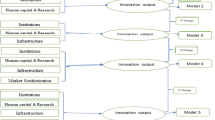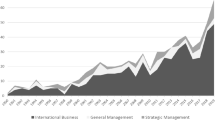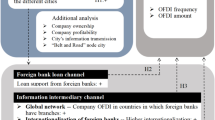Abstract
Multinational firms can access global talent in two ways: by employing migrants in their home country, or by employing foreign workers in their overseas affiliates. Taking a knowledge-based perspective, we conceptualize these employment decisions as simultaneous and subject to management coordination. Substitution effects are greater when there is a larger wage cost differential between home and host countries, leading to a cost-reduction motivation for foreign expansion and the offshoring of employment. Substitution also occurs when R&D intensive firms employ highly skilled and internationally mobile foreign workers and employ these where the worker’s knowledge and skills can be most productively put to use. In contrast, a complementary relationship occurs when the migrant country exhibits a high contextual distance with the home country of the firm, leading to knowledge (diversity) benefits of migrant employment at home when expanding abroad. Analyzing employee–employer and foreign affiliate data for multinational firms in the Netherlands (2008–2016) and estimating simultaneous equation models, we find support for these hypotheses. Our findings suggest that policies that restrict immigration may have a negative impact on the competitiveness of home-country multinational firms by limiting their ability to engage in value enhancing coordination of domestic and foreign employment growth.
Résumé
Les entreprises multinationales peuvent accéder aux talents mondiaux de deux manières : en employant des migrants dans leur pays d'origine ou en recourant aux travailleurs étrangers dans leurs filiales à l'étranger. Dans une perspective basée sur la connaissance, nous conceptualisons ces décisions d'emploi comme étant simultanées et sujettes à la coordination managériale. Les effets de substitution sont plus importants lorsque l'écart de coût salarial entre le pays d'origine et le pays d'accueil est plus grand, ce qui motive l'expansion à l'étranger et la délocalisation de l'emploi à des fins de réduction des coûts. La substitution se produit également lorsque les entreprises à forte intensité de R&D embauchent des travailleurs étrangers hautement qualifiés et mobiles à l'échelle internationale, et les emploient là où les connaissances et les compétences du travailleur peuvent être utilisées de la manière la plus productive. En revanche, une relation complémentaire se forme lorsque le pays d'origine du migrant présente une grande distance contextuelle par rapport à celui de l'entreprise, ce qui entraîne des avantages en matière de (diversité des) connaissances de l'emploi de migrants dans ce dernier lorsqu’elle se développe à l'étranger. Ces hypothèses sont corroborées par nos estimations des modèles d'équations simultanées et nos analyses des données relatives aux filiales étrangères et aux employés-employeurs des entreprises multinationales aux Pays-Bas (2008–2016). Nos résultats suggèrent que les politiques qui restreignent l'immigration peuvent exercer un impact négatif sur la compétitivité des entreprises multinationales du pays d'origine en limitant leur capacité à s'engager dans une coordination amélioratrice de valeur de la croissance de l'emploi domestique et étranger.
Resumen
Las empresas multinacionales pueden acceder a talento global de dos maneras: al emplear emigrantes de su propio país, o al emplear trabajadores extranjeros en sus filiales extranjeros. Tomando una perspectiva basada en conocimiento, conceptualizamos estas decisiones basadas en las decisiones tanto simultáneas como sujetas a la coordinación gerencial. Los efectos de sustitución son mayores cuando hay mayores costos cuando hay una diferencia de costos mayores entre el país de origen y el país anfitrión, llevando a una motivación por reducción de costos en la expansión extranjera y la deslocalización del empleo. La substitución también ocurre cuando las empresas intensivas en I+D emplean a trabajadores altamente calificados y con movilidad internacional y los emplean donde el conocimiento y las habilidades del trabajado puede ser aprovechada más productivamente. En contrario, una relación complementaria ocurre cuando del país migrante presenta una gran distancia contextual con el país de origen de la empresa, lo que conlleva beneficios de conocimiento (diversidad) del empleo migrante en el país de origen cuando se expande al extranjero. Analizando datos de empleados-empleadores y filiales extranjeras de empresas multinacionales en los Países Bajos (2008–2016) y usando estimaciones de modelos de ecuaciones simultáneas, encontramos apoyo para estas hipótesis. Nuestros hallazgos indican que las políticas que restringen la inmigración pueden tener un impacto negativo en la competitividad de las empresas multinacionales del país de origen al limitar su capacidad para participar en la coordinación del crecimiento del empleo nacional y extranjero para aumentar el valor.
Resumo
Empresas multinacionais conseguem acessar talentos globais de duas formas: empregando migrantes em seu país de origem ou empregando trabalhadores estrangeiros em suas afiliadas no exterior. A partir de uma perspectiva baseada no conhecimento, conceituamos essas decisões de emprego como simultâneas e sujeitas à coordenação gerencial. Efeitos de substituição são maiores quando há uma maior diferença de custos salariais entre países de origem e acolhimento, levando a uma motivação de redução de custos via expansão estrangeira e a transferências de posições de emprego para o exterior. Substituição também ocorre quando empresas intensivas em R&D empregam trabalhadores estrangeiros altamente qualificados e com mobilidade internacional e os empregam onde o conhecimento e as habilidades do trabalhador podem ser aplicados de maneira mais produtiva. Em contraste, uma relação complementar ocorre quando o país migrante apresenta uma alta distância contextual em relação ao país de origem da empresa, gerando benefícios de conhecimento (diversidade) do emprego migrante no país de origem quando se expande para o exterior. Analisando dados de empregados-empregadores e afiliados estrangeiros de empresas multinacionais na Holanda (2008–2016) e estimando modelos de equações simultâneas, encontramos suporte para essas hipóteses. Nossas descobertas sugerem que políticas que restringem imigração podem ter um impacto negativo na competitividade de empresas multinacionais do país de origem por limitar sua capacidade de se envolver na coordenação do crescimento de emprego doméstico e estrangeiro que agrega valor.
摘要
跨国公司可以通过两种方式获得全球人才: 在本国雇佣移民, 或在海外分支机构雇佣外国工人。运用知识基础观我们将这些就业决策概念化为联合及服从管理协调。当母国和东道国之间的工资成本差异较大时替代效应较大, 这导致了对外扩张和就业离岸外包的成本降低动机。当研发密集型公司雇佣高技能和国际流动的外国工人并在工人的知识和技能能够最有效地发挥作用的地方雇佣这些工人时, 替代也会发生。 相比之下, 当移民国与公司母国表现出较高的情境距离时, 互补关系会出现, 这导致在海外扩张时移民在国内就业带来知识 (多样性) 好处。通过分析荷兰跨国公司 (2008–2016年) 的雇员-雇主和外国分公司的数据并估算联立方程模型, 我们发现这些假设得到了支持。我们的研究结果表明, 限制移民的政策可能会限制母国跨国公司参与国内外就业增长的增值协调的能力, 从而对其竞争力产生负面影响。
Similar content being viewed by others
REFERENCES
Agrawal, A., Cockburn, I., & McHale, J. 2006. Gone but not forgotten: Knowledge flows, labor mobility, and enduring social relationships. Journal of Economic Geography, 6(5): 571–591.
Al Ariss, A., Cascio, W. F., & Paauwe, J. 2014. Talent management: Current theories and future research directions. Journal of World Business, 49(2): 173–179.
Almeida, P., Song, J., & Grant, R. M. 2002. Are firms superior to alliances and markets? An empirical test of cross-border knowledge building. Organization Science, 13(2): 147–161.
Andersson, M., Castellani, D., Fassio, C., & Jienwatcharamongkhol, V. 2022. Leaving the multinational: The likelihood and nature of employee mobility from MNEs. Journal of International Business Studies, 53(5): 936–949.
Andersson, U. R., Brewster, C. J., Minbaeva, D. B., Narula, R., & Wood, G. T. 2019. The IB/IHRM interface: Exploring the potential of intersectional theorizing. Journal of World Business, 54(5): 100998.
Barnard, H., Deeds, D., Mudambi, R., & Vaaler, P. M. 2019. Migrants, migration policies, and international business research: Current trends and new directions. Journal of International Business Policy, 2(4): 275–288.
Bascle, G. 2008. Controlling for endogeneity with instrumental variables in strategic management research. Strategic Organization, 6(3): 285–327.
Baum, C. F., Schaffer, M. E., & Stillman, S. 2007. Enhanced routines for instrumental variables/generalized method of moments estimation and testing. The Stata Journal, 7(4): 465–506.
Belderbos, R., Fukao, K., Ito, K., & Letterie, W. 2013. Global fixed capital investment by multinational firms. Economica, 80(318): 274–299.
Belderbos, R., Grabowska, M., Kelchtermans, S., Leten, B., Jacob, J., & Riccaboni, M. 2021. Whither geographic proximity? Bypassing local R&D units in foreign university collaboration. Journal of International Business Studies, 52: 1302–1330.
Belderbos, R. A., & Heijltjes, M. I. G. 2005. The determinants of expatriate staffing by Japanese multinationals in Asia: control, learning and vertical business groups. Journal of International Business Studies, 36(3): 341–354.
Beugelsdijk, S., Ambos, B., & Nell, P. C. 2018. Conceptualizing and measuring distance in international business research: Recurring questions and best practice guidelines. Journal of International Business Studies, 49(9): 1113–1137.
Beugelsdijk, S., Nell, P. C., & Ambos, B. 2017. When do distance effects become empirically observable? An investigation in the context of headquarters value creation for subsidiaries. Journal of International Management, 23(3): 255–267.
Blonigen, B. A., Davies, R. B., Waddell, G. R., & Naughton, H. T. 2007. FDI in space: Spatial autoregressive relationships in foreign direct investment. European Economic Review, 51, 1303–1325.
Boone, C., Lokshin, B., Guenter, H., & Belderbos, R. 2019. Top management team nationality diversity, corporate entrepreneurship, and innovation in multinational firms. Strategic Management Journal, 40(2): 277–302.
Breschi, S., & Lissoni, F. 2009. Mobility of skilled workers and co-invention networks: An anatomy of localized knowledge flows. Journal of Economic Geography, 9(4): 439–468.
Brouthers, L. E., Werner, S., & Wilkinson, T. J. 1996. The aggregate impact of firms’ FDI strategies on the trade balances of host countries. Journal of International Business Studies, 27(2): 359–373.
Campbell, B. A., Coff, R., & Kryscynski, D. 2012. Rethinking sustained competitive advantage from human capital. The Academy of Management Review, 37(3): 376–395.
Card, D. 2005. Is the new immigration really so bad? The Economic Journal, 115(507): F300–F323.
Certo, S. T., Busenbark, J. R., Woo, H.-S., & Semadeni, M. 2016. Sample selection bias and Heckman models in strategic management research. Strategic Management Journal, 37(13): 2639–2657.
Choudhury, P. 2017. Innovation outcomes in a distributed organization: Intrafirm mobility and access to resources. Organization Science, 28(2): 339–354.
Choudhury, P., & Kim, D. Y. 2019. The ethnic migrant inventor effect: Codification and recombination of knowledge across borders. Strategic Management Journal, 40(2): 203–229.
Dewhurst, M., Pettigrew, M., & Srinivasan, R. 2012. How multinationals can attract the talent they need. McKinsey Quarterly, 3: 92–99.
Dow, D., & Amal, K. 2006. Developing a multidimensional instrument to measure psychic distance stimuli. Journal of International Business Studies, 37(5): 578–602.
Edler, J., Fier, H., & Grimpe, C. 2011. International scientist mobility and the locus of knowledge and technology transfer. Research Policy, 40(6): 791–805.
Foad, H. 2012. FDI and immigration: A regional analysis. The Annals of Regional Science, 49(1): 237–259.
Foley, C. F., & Kerr, W. R. 2013. Ethnic innovation and U.S. multinational firm activity. Management Science, 59: 1529–1544.
Foss, N. J., Lyngsie, J., & Zahra, S. A. 2013. The role of external knowledge sources and organizational design in the process of opportunity exploitation. Strategic Management Journal, 34(12): 1453–1471.
Froese, F. J., Stoermer, S., Reiche, B. S., & Klar, S. 2020. Best of both worlds: How embeddedness fit in the host unit and the headquarters improve repatriate knowledge transfer. Journal of International Business Studies, 52(7): 1331–1349.
Hajro, A., Caprar, D. V., Zikic, J., & Stahl, G. K. 2021. Global migrants: Understanding the implications for international business and management. Journal of World Business, 56(2): 101192.
Harrison, A., & McMillan, M. 2011. Offshoring jobs? Multinationals and U.S. manufacturing employment. The Review of Economics and Statistics, 93(3): 857–875.
Harrison, D. A., Harrison, T., & Shaffer, M. A. 2019. Strangers in strained lands: learning from workplace experiences of immigrant employees. Journal of Management, 45(2): 600–619.
Harzing, A.-W., Pudelko, M., & Sebastian Reiche, B. 2016. The bridging role of expatriates and inpatriates in knowledge transfer in multinational corporations. Human Resource Management, 55(4): 679–695.
Hernandez, E., & Kulchina, E. 2020. Immigrants and foreign firm performance. Organization Science, 31(4): 797–820.
Hofstede, G., Hofstede, G. J., & Minkov, M. 2010. Cultures and organizations: Software of the mind. Revised and expanded (3rd ed.). New York: McGraw-Hill USA.
Janicki, H. P., & Wunnava, P. V. 2004. Determinants of foreign direct investment: empirical evidence from EU accession candidates. Applied Economics, 36(5): 505–509.
Javorcik, B. S., Özden, Ç., Spatareanu, M., & Neagu, C. 2011. Migrant networks and foreign direct investment. Journal of Development Economics, 94(2): 231–241.
Jeanty, P. W., Partridge, M., & Irwin, E. 2010. Estimation of a spatial simultaneous equation model of population migration and housing price dynamics. Regional Science and Urban Economics, 40(5): 343–352.
Kerr, S. P., Kerr, W., Özden, Ç., & Parsons, C. 2016. Global talent flows. Journal of Economic Perspectives, 30(4): 83–106.
Kogut, B., & Singh, H. 1988. The effect of national culture on the choice of entry mode. Journal of International Business Studies, 19(3): 411–432.
Kogut, B., & Zander, U. 1993. Knowledge of the Firm and the Evolutionary Theory of the Multinational Corporation. Journal of International Business Studies, 24(4): 625–645.
Kovak, B. K., Oldenski, L., & Sly, N. 2021. The labor market effects of offshoring by U.S. multinational firms. The Review of Economics and Statistics, 103(2): 381–396.
Kunczer, V., Lindner, T., & Puck, J. 2019. Benefitting from immigration: The value of immigrants’ country knowledge for firm internationalization. Journal of International Business Policy, 2(4): 356–375.
Laursen, K., Leten, B., Nguyen, N. H., & Vancauteren, M. 2020. Mounting corporate innovation performance: The effects of high-skilled migrant hires and integration capacity. Research Policy, 49: 1040998.
Lewin, A. Y., Massini, S., & Peeters, C. 2009. Why are companies offshoring innovation? The emerging global race for talent. Journal of International Business Studies, 40(6): 901–925.
Meyer, K. E., Li, C., & Schotter, A. P. J. 2020. Managing the MNE subsidiary: Advancing a multi-level and dynamic research agenda. Journal of International Business Studies, 51(4): 538–576.
Minbaeva, D., Pedersen, T., Björkman, I., Fey, C. F., & Park, H. J. 2014. MNC knowledge transfer, subsidiary absorptive capacity and HRM. Journal of International Business Studies, 45(1): 38–51.
Morris, S., Snell, S., & Björkman, I. 2016. An architectural framework for global talent management. Journal of International Business Studies, 47(6): 723–747.
Narula, R., Asmussen, C. G., Chi, T., & Kundu, S. K. 2019. Applying and advancing internalization theory: The multinational enterprise in the twenty-first century. Journal of International Business Studies, 50(8): 1231–1252.
Ng, E. S. W., & Burke, R. J. 2005. Person-organization fit and the war for talent: Does diversity management make a difference? International Journal of Human Resource Management, 16(7): 1195–1210.
Nunziata, L. 2003. Labour market institutions and the cyclical dynamics of employment. Labour Economics, 10(1): 31–53.
Olney, W. W., & Pozzoli, D. 2021. The impact of immigration on firm-level offshoring. The Review of Economics and Statistics, 103(1): 177–195.
Rauch, J. E., & Trindade, V. 2002. Ethnic Chinese networks in international trade. The Review of Economics and Statistics, 84(1): 116–130.
Rosenkopf, L., & Almeida, P. 2003. Overcoming local search through alliances and mobility. Management Science, 49(6): 751–766.
Song, J., Almeida, P., & Wu, G. 2003. Learning-by-hiring: When is mobility more likely to facilitate interfirm knowledge transfer? Management Science, 49(4): 351–365.
Stahl, G. K., Björkman, I., Farndale, E., Morris, S. S., Paauwe, J., & Stiles, P. 2012. Six principles of effective global talent management. MIT Sloan Management Review, 53(2): 25–32.
Stock, J., & Yogo, M. 2005. Testing for weak instruments in linear IV regression. In W. K. A. Donald (Ed.), Identification and inference for econometric models: 80–108. New York: Cambridge University Press.
Useche, D., Miguelez, E., & Lissoni, F. 2019. Highly skilled and well connected: Migrant inventors in cross-border M&As. Journal of International Business Studies, 51(5): 737–763.
Vaiman, V., Scullion, H., & Collings, D. 2012. Talent management decision making. Management Decision, 50(5): 925–941.
Vora, D., Martin, L., Fitzsimmons, S. R., Pekerti, A. A., Lakshman, C., & Raheem, S. 2019. Multiculturalism within individuals: A review, critique, and agenda for future research. Journal of International Business Studies, 50(4): 499–524.
Wang, D. 2015. Activating cross-border brokerage: Interorganizational knowledge transfer through skilled return migration. Administrative Science Quarterly, 60(1): 133–176.
Zellner, A., & Theil, H. 1992. Three-stage least squares: Simultaneous estimation of simultaneous equations. In B. Raj, & J. Koerts (Eds.), Henri Theil’s contributions to economics and econometrics: econometric theory and methodology: 147–178. Netherlands Dordrecht: Springer.
ACKNOWLEDGEMENTS
The authors are grateful for constructive comments received from three anonymous reviewers, the editors Anu Phene, Stacey Fitzsimmons, Dana Minbaeva, and Sjoerd Beugelsdijk, participants at the paper development workshop for the JIBS special issue on global mobility, and participants at the AIB 2021 conference, the GEOINNO 2020 conference, the DRUID 2020 conference, the 2021 Migration and Organizations Conference and the 4th workshop on Migration, Globalization and the Knowledge Economy. The authors wish to thank Gerard Pfann, Keld Laursen, Wendy Smits and Sabien Dobbelaere for their valuable comments on earlier versions of the paper, and Statistics Netherlands (in particular the KIO team) for providing us access to the data and their support with data processing.
Author information
Authors and Affiliations
Corresponding author
Additional information
Publisher's Note
Springer Nature remains neutral with regard to jurisdictional claims in published maps and institutional affiliations.
Accepted by Anupama Phene, Guest Editor, 1 June 2023. This article has been with the authors for three revisions.
Supplementary Information
Below is the link to the electronic supplementary material.
Rights and permissions
Springer Nature or its licensor (e.g. a society or other partner) holds exclusive rights to this article under a publishing agreement with the author(s) or other rightsholder(s); author self-archiving of the accepted manuscript version of this article is solely governed by the terms of such publishing agreement and applicable law.
About this article
Cite this article
Belderbos, R., Leten, B., Nguyen, N.H. et al. Multinational firms and the quest for global talent: Employing (skilled) foreign workers at home and abroad. J Int Bus Stud (2023). https://doi.org/10.1057/s41267-023-00643-w
Received:
Revised:
Accepted:
Published:
DOI: https://doi.org/10.1057/s41267-023-00643-w




